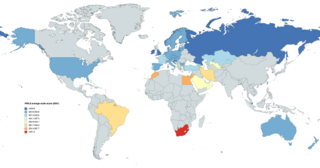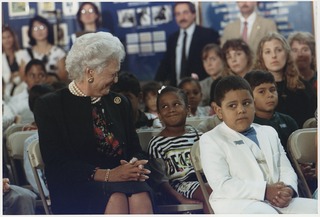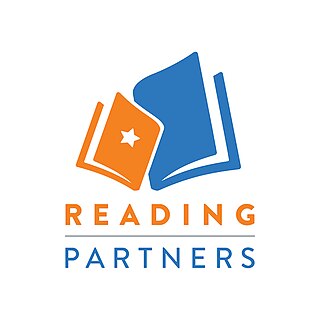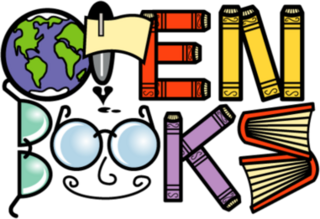
Phonics is a method for teaching reading and writing to beginners. To use phonics is to teach the relationship between the sounds of the spoken language (phonemes), and the letters (graphemes) or groups of letters or syllables of the written language. Phonics is also known as the alphabetic principle or the alphabetic code. It can be used with any writing system that is alphabetic, such as that of English, Russian, and most other languages. Phonics is also sometimes used as part of the process of teaching Chinese people to read and write Chinese characters, which are not alphabetic, using pinyin, which is alphabetic.
Children International is a global nonprofit humanitarian organization that helps children break the cycle of poverty. It addresses children’s critical needs through early intervention and regular interaction in community centers. The goal is to help children overcome the effects of poverty, support their education, and prepare youth to contribute to society.

The IEA's Progress in International Reading Literacy Study (PIRLS) is an international study of reading (comprehension) achievement in 9-10 year olds. It has been conducted every five years since 2001 by the International Association for the Evaluation of Educational Achievement (IEA). It is designed to measure children's reading literacy achievement, to provide a baseline for future studies of trends in achievement, and to gather information about children's home and school experiences in learning to read.
Accelerated Reader (AR) is an educational program created by Renaissance Learning. It is designed to monitor and manage students' independent reading practice and comprehension in both English and Spanish. The program assesses students' performance through quizzes and tests based on the books they have read. As the students read and take quizzes, they are awarded points. AR monitors students' progress and establishes personalised reading goals according to their reading levels.
Adolescent literacy refers to the ability of adolescents to read and write. Adolescence is a period of rapid psychological and neurological development, during which children develop morally, cognitively, and socially. All of these three types of development have influence—to varying degrees—on the development of literacy skills.

The most recent comprehensive data on adult literacy in the United States come from the Program for the International Assessment of Adult Competencies (PIAAC) study conducted in stages from 2012 to 2017 by the National Center for Education Statistics (NCES). English literacy test results from 2014 suggest that 21% of U.S. adults ages 16 to 65 score at or below PIAAC literacy level 1, meaning they have difficulty "[completing] tasks that require comparing and contrasting information, paraphrasing, or making low-level inferences." Included in that 21% is the 4.2% of respondents who were unable to be assessed due to language barriers, cognitive disability, or physical disability. A 2020 study by the Gallup analysis company funded by the Barbara Bush Foundation for Family Literacy estimated that getting all U.S. adults to at least PIAAC literacy level 3 proficiency would raise American's incomes by $2.2 trillion.

Reading is the process of taking in the sense or meaning of symbols, often specifically those of a written language, by means of sight or touch.
The Chen Yet-Sen Family Foundation (CYSFF) is a Hong Kong-administered charitable institution established in 2003 by the Chen family, with a dual focus on childhood literacy and vision correction - two fields central to the educational development of people throughout their lives. CYSFF works closely with various non-profit organizations to help them implement "innovative" and "cost effective" programs.
A sighted child who is reading at a basic level should be able to understand common words and answer simple questions about the information presented. They should also have enough fluency to get through the material in a timely manner. Over the course of a child's education, these foundations are built on to teach higher levels of math, science, and comprehension skills. Children who are blind not only have the education disadvantage of not being able to see: they also miss out on the very fundamental parts of early and advanced education if not provided with the necessary tools.
The Braille Challenge is an annual two-stage Braille literacy competition designed to motivate blind students to emphasize their study of Braille. The program parallels with the importance and educational purpose of a spelling bee for sighted children. Braille is a reading and writing method that breaks language into a code of raised dots. There are three grades of braille:

Reading Partners is a children's literacy nonprofit based in Oakland, California with programs in over 40 school districts throughout California, New York, Washington DC, Maryland, Texas, Colorado, South Carolina, Minnesota, Oklahoma, and Washington.
SMART Reading is a children's literacy non-profit, volunteer-driven tutoring program local to Oregon for at-risk K-3 readers. SMART was developed by Neil Goldschmidt and the law firm Ater Wynne Hewitt Dodson & Skerritt, LLP in 1992. It has grown from serving 585 children at 8 schools at its inception to serving 7,244 children at 204 sites in 2009, and 223 sites in 2011. As of December 2011, the organization's annual budget was $2.7 million.
Worldreader is a 501(c)(3) global nonprofit organization working with partners to get children reading at least 25 books a year with understanding.

ABCmouse.com Early Learning Academy is a digital education program for children ages 2–8, created by the edtech company Age of Learning, Inc. The program offers educational games, videos, puzzles, printables, and a library of regular and “read-aloud” children’s books, covering subjects including reading and language arts, math, science, health, social studies, music, and art.
Access Books is a nonprofit volunteer organization that gives books to disadvantaged children's libraries in Southern California. These are primarily public and charter school libraries in the inner city, where over 90% of the population lives in poverty and books are generally scarce. As one study showed, children in Beverly Hills have ready access to as many as 400 times more books than children living in the Compton and Watts areas of South Los Angeles. Underfunded libraries also tend to be in worse physical condition and less user-friendly than their affluent counterparts.

The World Literacy Foundation(WLF) is a global not-for-profit that works to lift young people out of poverty through literacy. Founded in Melbourne, Australia in 2003, the World Literacy Foundation operates on the principle that education is a basic human right. It aims to eradicate global illiteracy through the promotion of literacy and the provision of educational resources.

The Literacy Coalition of Palm Beach County is a nonprofit organization headquartered in Boynton Beach, Florida. Its stated mission is to improve literacy in Palm Beach County. One in seven adults in Palm Beach County is unable to read and understand information found in books, newspapers, magazines, brochures and manuals. The organization's operates with the assistance of over 9,000 volunteers. In 2013, the Literacy Coalition provided services to more than 25,000 adults, to children and families.
Reading tutoring is supplemental reading practice that occurs outside of the school reading curriculum. It usually has some type of consistent structure and can take place at a school, a tutoring center, or at home. The tutor can be a professional, paraprofessional, volunteer, or family member. Reading tutoring can be used for all ages, and is dependent on reading ability and/or level.

Open Books is a nonprofit organization based in Chicago, Illinois, that sells donated books to fund literacy programs for kids. Founded by Stacy Ratner in 2006, Open Books has since started several literacy programs for kids, and has taken part in literacy events in Chicago. Open Books has three store locations, based in Pilsen, West Loop, and Logan Square areas of Chicago. Open Books employs adult volunteers who work in their bookstores, and with participants during literacy workshops.
Previously known as Innovations for Learning, Chapter One is a global education nonprofit organization, dedicated to improving early literacy outcomes for children in under-resourced schools. It is grounded in the belief that learning to read is a basic civil right with the power to transform lives. Chapter One recognizes the systemic barriers faced by students from low-income backgrounds, students of color, English Language Learners, and students with learning disabilities, therefore its stated mission is to provide equitable early literacy access and solutions to marginalized student populations. Founded by Seth Weinberger in 1993, the philanthropically supported initiative strives to bridge the gap by providing a literacy model to accelerate beginner reading for all students, regardless of socioeconomic background, race, language barriers, or learning differences primarily in Title 1 eligible schools.









